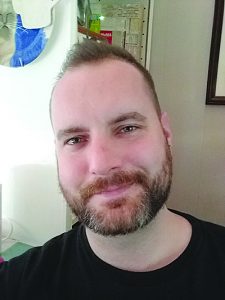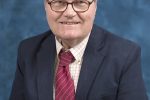Staring down life’s inevitable conclusion

Death is the inevitable conclusion to life.
Said so dryly, you’d picture these words coming from the mouth of an intellectual archetype wearing a black turtleneck, wire-rimmed glasses and a placid expression.
It’s true. No living, breathing being is immortal; no matter how permanent life seems, its impermanence is what makes it a gift.
As much truth as there is in this statement, it doesn’t make it hurt any less to see someone suffer and know that the time you must ultimately say good-bye is drawing near.
I was born a Catholic, and as is the case for most Catholic children, my parents assigned me a Godfather at birth. For me, that man is my uncle – my mom’s oldest brother, Ted.
Ted is a retired lawyer, a father of two grown daughters, a husband and a grandfather. He’s a brilliant man who has accomplished much and lived life to the fullest. He’s seen the world, and the world has been a better place for having him in it.
He’s special to me because he’s a man who helped raise me after my dad died when I was 15. He, along with my other uncles, were omnipresent men who fully embraced the notion that it takes a village to raise a child. What he provided was so crucial to my upbringing: He was not afraid to administer tough love and to sternly but lovingly correct me when I was being an ornery, petulant teenager.
He was able to balance that with being a fun uncle in every sense of the word. He, my aunt and my two cousins lived in the same neighborhood as I did for most of my childhood. We had a close-knit family, and summers were often spent hanging out in his backyard, where he’d smoke awesome briskets while we’d all horse around in the pool. My dad – his college roommate – would entertain all of us in the water while Uncle Ted manned the pit. He took me to my first baseball game (Texas Rangers against the Milwaukee Brewers, with Nolan Ryan pitching, if I remember right) when I was 11, making it a point to see that I didn’t leave the stadium without a baseball cap and a ballpark hot dog. I don’t remember if the Rangers won, but it didn’t matter. I was definitely hooked on baseball after seeing it live.
A Texas A&M alum, he took me to my first Aggie football game in 1996 and walked the campus with me, giving me the only tour I’d ever get of the seemingly gargantuan school before orientation in 1997 when I started college, following in his footsteps. And he didn’t even needle me too much for loving Aggie jokes when I was a kid, having been taught a litany of them by my mostly Longhorn family.
Those were among my best childhood memories, and they’ve stuck around to this day.
After my dad died, he made sure we all had a proper summer vacation, taking me, my mom, and my three sisters to San Antonio to check out Sea World, eat Mexican food on the Riverwalk, and hang out at a sweet resort. His generosity didn’t just extend to us – it extended to people he didn’t even know, especially as he grew older. My cousin told me he’d write checks to perfect strangers who were in need of a boost, and didn’t care if he never saw the money again. He just wanted to help.
In 2009, he was diagnosed with prostate cancer, and it was unfortunately not the easy-to-control Stage 1 diagnosis that represents the best-case scenario. I found out this weekend from my cousin, his oldest daughter, that his diagnosis had been way more grave than anyone had known. They’d told him years ago that, realistically, a cure was not really in the cards, but they could buy him time with treatments, she’d said.
Weaker men would have wavered, but Ted is a man of strong faith. He listened to his doctors. He did what they said. And he prayed a lot. He kept working as an attorney as his doctors tried different drugs and treatments on him. They got his numbers under control and he continued to enjoy his life for many years, with no ostensible difference other than a long white goatee that he allowed himself to grow after many years as a clean-shaven corporate attorney.
He seemed to be loving life, continuing to make trips every weekend to College Station to see his daughter and granddaughter and watch his Aggies play at Kyle Field. As far as most of us knew, he was just fine a year after his initial diagnosis.
But one day, he wasn’t. He headed to a checkup and learned that his numbers were spiraling out of control. Not one to give up, he signed on for aggressive chemotherapy that wrecked his respiratory system and ultimately seems to have been no match for the cancer, which metastasized, spreading to his bones.
At the time of this writing, Ted lives, but he likely doesn’t have long. He’s in home hospice care at his house in Dallas, where my aunt is caring for him around the clock.
Saturday night, right after the Chamber of Commerce banquet, I got a call from his oldest daughter, who said things had taken a bad turn and he didn’t have much time. I jumped in the car and sped to Dallas, hoping I wouldn’t be too late.
I wasn’t. He was still with us when I arrived, and by late afternoon Sunday, a bunch of us – his brothers, his mother, his wife, his children, and myself – had gathered around his bed to show our support and love for the guy who had been a rock for many of us.
It was hard to see an erstwhile robust man brought down by the ruthless beast that is cancer , and a brilliant mind robbed of coherence by high-test opioids meant to help stifle bone-rattling pain. We all had a hard time masking our tears as we tried to appear as cheerful as possible. He didn’t say much, and it was hard to know just how much of the visit he was processing.
But in a moment of clarity, he broke through the painkiller fog and looked around at us, smiling weakly. He rasped something inaudible and we all looked his direction.
He tried again. This time, he got it out.
“This iis like Christmas,” he gasped.
In a way, I suppose it was. But the real gift has been having him as my uncle.


